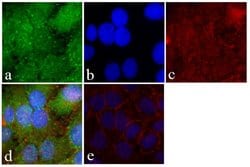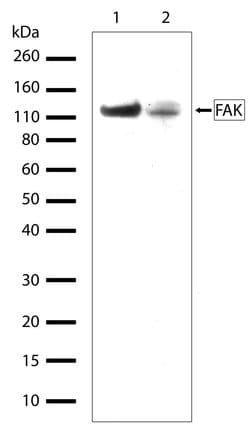Learn More
Invitrogen™ FAK Recombinant Rabbit Monoclonal Antibody (5H18L19)
Rabbit Recombinant Monoclonal Antibody
Supplier: Invitrogen™ 701094
Description
This antibody is predicted to react with mouse based on sequence homology. Intact IgG appears on a non-reducing gel as ~150 kDa band and upon reduction generating a ~25 kDa light chain band and a ~50 kDa heavy chain. Recombinant rabbit monoclonal antibodies are produced using in vitro expression systems. The expression systems are developed by cloning in the specific antibody DNA sequences from immunoreactive rabbits. Then, individual clones are screened to select the best candidates for production. The advantages of using recombinant rabbit monoclonal antibodies include: better specificity and sensitivity, lot-to-lot consistency, animal origin-free formulations, and broader immunoreactivity to diverse targets due to larger rabbit immune repertoire.
Focal Adhesion Kinase (FAK) is a 125 kDa non-receptor protein tyrosine kinase that acts as a substrate for Src and is a key element of integrin signaling. FAK plays an important role in cell spreading, differentiation, migration, cell death, and acceleration of the G1 to S phase transition of the cell cycle. FAK has a central catalytic domain and a C-terminal tail that localizes it to focal adhesions, which are sites where cells attach to the extracellular matrix via surface integrin receptors. Increased FAK tyrosine phosphorylation occurs upon integrin engagement with fibronectin. Adhesion of murine NIH3T3 fibroblasts to fibronectin promotes association of the Grb2 adapter protein and c-Src PTK with FAK in vivo, and also results in activation of the ERK2 MAP kinase. In v-Src-transformed NIH3T3, the association of v-Src, Grb2, and Sos with FAK is independent of cell adhesion to fibronectin. In vitro the Grb2 SH2 domain binds directly to tyrosine-phosphorylated FAK, and the binding site has been identified as Tyr925 by site directed mutagenesis. Several transcript variants encoding different isoforms have been found for the FAK gene, but the full-length natures of only three of them have been determined.
Specifications
| FAK | |
| Recombinant Monoclonal | |
| 0.5 mg/mL | |
| PBS with 0.09% sodium azide | |
| Q05397 | |
| PTK2 | |
| Recombinant protein corresponding to amino acids 853-1052 of human FAK1. | |
| 100 μg | |
| Primary | |
| Human | |
| Antibody | |
| IgG |
| Western Blot, Immunocytochemistry | |
| 5H18L19 | |
| Unconjugated | |
| PTK2 | |
| CG10023; CG10023-PA; CG10023-PB; CG10023-PC; CG10023-PD; CG10023-PF; CG10023-PG; CT28129; DFAK; DFak56; Dmel\CG10023; Dmel_CG10023; DmFAK; EC 2.7.10.2; Fadk; FADK 1; Fak; Fak1; Fak56; fak56D; FAK65D; Fak-PA; Fak-PB; Fak-PC; Fak-PD; Fak-PF; Fak-PG; FAK-related non-kinase polypeptide; focal adhesion kinase; Focal adhesion kinase 1; focal adhesion kinase homolog; focal adhesion kinase isoform FAK-Del33; focal adhesion kinase pp125FAK; focal adhesion kinase-related nonkinase; focal ashension kinase 1; FRNK; I79_019430; Kiaa4203; mKIAA4203; p125FAK; p41/p43FRNK; pFAK; pp125 PTK2; pp125FAK; PPP1R71; Protein phosphatase 1 regulatory subunit 71; protein phosphatase 1, regulatory subunit 71; protein tyrosine kinase 2; protein tyrosine kinase 2 L homeolog; protein-tyrosine kinase; protein-tyrosine kinase 2; PTK2; PTK2 protein tyrosine kinase 2; ptk2.L; tyrosine kinase; XELAEV_18032408mg; XPFAK | |
| Rabbit | |
| Protein A | |
| RUO | |
| 5747 | |
| Store at 4°C short term. For long term storage, store at -20°C, avoiding freeze/thaw cycles. | |
| Liquid |
Your input is important to us. Please complete this form to provide feedback related to the content on this product.

